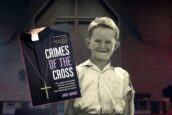
A Dangerous Idea: “Love Your Enemy”

During the 2018 Festival of Dangerous Ideas, former member of the Westboro Baptist Church, Megan Phelps-Roper engaged in conversation with Fauziah Ibrahim on the subject, “Love Your Enemy”.
The Festival of Dangerous Ideas is an annual event that aims to promote public debate on a number of controversial topics. This year’s festival included events at Sydney Town Hall and Cockatoo Island.
Held at the Cockatoo Island precinct, “Love Your Enemy” was wide-ranging discussion which explored how she left the controversial sect, the state of public debate, and the nature of faith.
“People don’t change their…beliefs in an instant.”
A self described Baptist church not affiliated with any mainstream denomination, Westboro Baptist Church has become known for their hateful online presence. Westboro Baptist have picketed soldiers’ funerals with homophobic signs, arguing that every death is God’s punishment on America for being too lenient towards LGBTI people.
Mrs Phelps-Roper left the a sect, which includes most of her family, in 2012.
She told the audience that she left Westboro Baptist Church after engaging with some family members who had left.
She said the experience had taught her that “People don’t change their…beliefs in an instant.”
“We actually have to make the arguments. It’s not enough to speak to people on our side [and stay in our silos].”
This, Mrs Phelps-Roper argued, applied to Twitter, where she deliberately follows people she disagrees with.
Sometimes, this included reminding herself that the other person she was engaging with “is a smart, intelligent, good-hearted person.”
“We can choose to…seek out information that contradicts our ideas,” she said.
The conversation turned to online outrage and ‘call-out culture’. Asked what she thought should happen to people who expressed illiberal or offensive ideas on social media, Mrs Phelps-Roper argued that people needed to engage.
She said that people were all too often quick to pile-on when someone made an offensive remark or tweet.
“It’s a partisan cultural thing,” Mrs Phelps Roper said.
“This is what my family does, they assume the worst possible intent.”
…or rather, some*one* beautiful.
Welcome to the world, little Sølvi Lynne.👶🏼💖✨ pic.twitter.com/eZkAEXALdu
— Megan Phelps-Roper (@meganphelps) October 7, 2018
Mrs Phelps-Roper is now married. In October, she gave birth to her first child, Sølvi Lynne.
Asked by Ms Ibrahim about what she would give her daughter that she didn’t have growing up, she said she’d raise her to be understanding of others’ differences, adding that she still had compassion for her own mother.
“My mum is one of the most generous, hospitable people I know. To contradict (what she was raised to believe) is to end up in hell for eternity. I know that my mum still loves and cares for me, but she cannot show me that.”
Growing up, Mrs Phelps Roper would join the picket lines with hateful placards in hand from “the age of five”.
She was told not to reach out to friends and family members who had left the church. “
“People just faded away,” she said. “I chose to be there for several years after I turned eighteen,” she recalled.
“I technically could have left. All of that stuff doesn’t go away. I have a lot of empathy for my family.”
Blind faith is a dangerous idea
Mrs Phelps-Roper describes herself now as not religious. She believes “in hope and humanity” but no longer believes in God, at least in terms of the understanding of God that she was raised with. Asked by an audience member as to whether she thinks religion is a force for good or evil, she said, “I think it depends on what you consider religion.”
“Blind faith is a bad idea, is a dangerous idea. That is not the only kind of religion that there is.”
As an example of a life giving and questioning faith, Mrs Phelps Roper cited an evangelical Christian friend who told her she didn’t like the apostle Paul, or believe in most of what he writes.
“And I’m like, “You can do that?””
Jonathan Foye is Insights’ Editor




























































